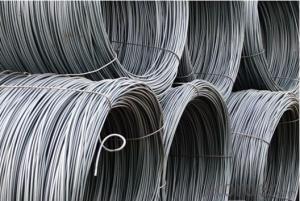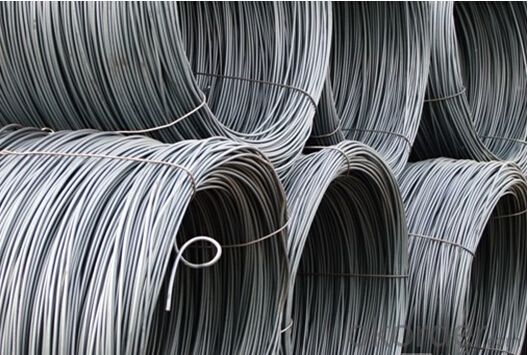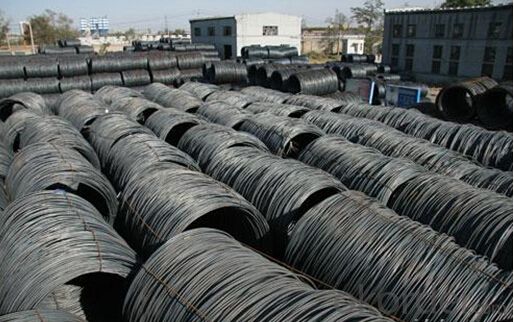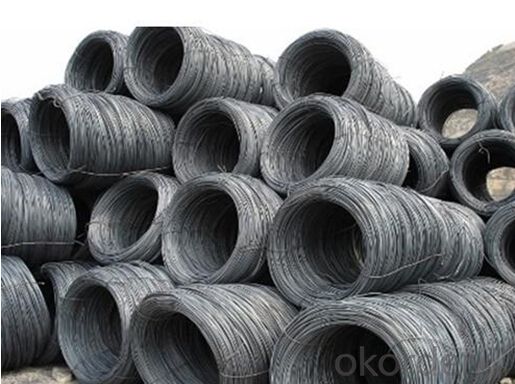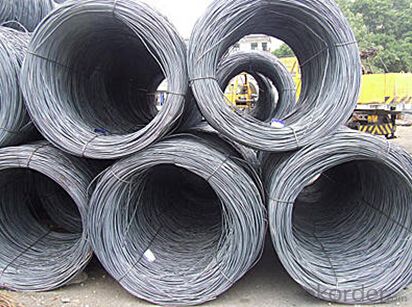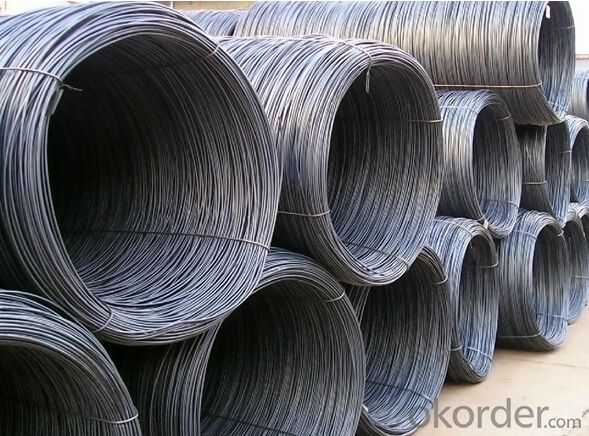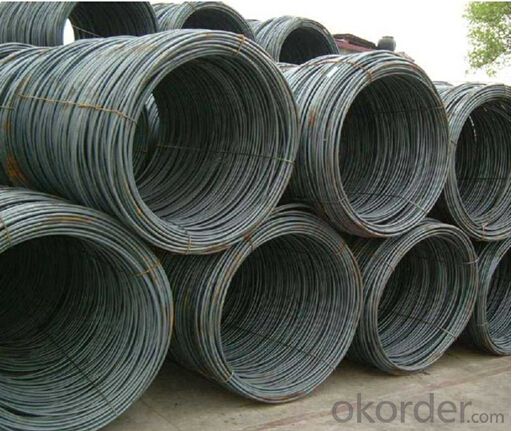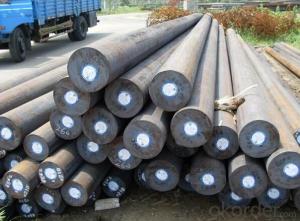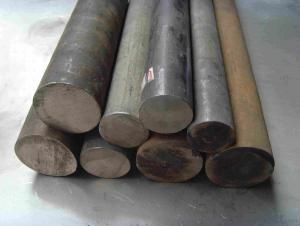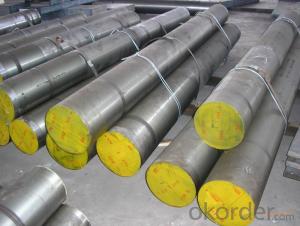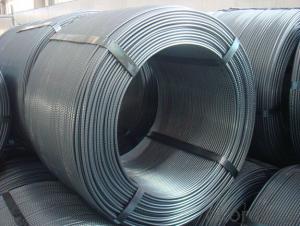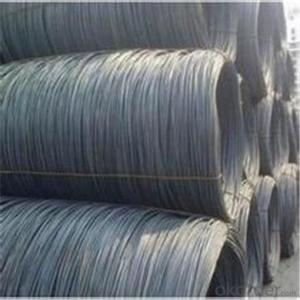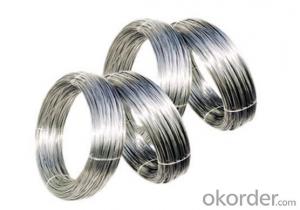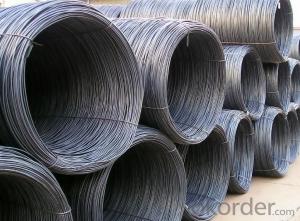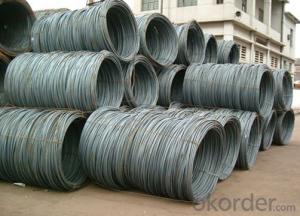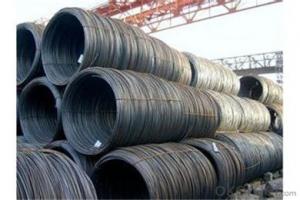5.5mm SAE1008 Steel Nail Wire Rod Manufacturer
- Loading Port:
- Tianjin
- Payment Terms:
- TT OR LC
- Min Order Qty:
- 10 m.t.
- Supply Capability:
- 10000 m.t./month
OKorder Service Pledge
OKorder Financial Service
You Might Also Like
Specification
5.5mm SAE1008 Steel Nail Wire Rod Manufacturer
Details of the 5.5mm SAE1008 Steel Nail Wire Rod Manufacturer
| Steel Grade | Q195-Q235,Q235,SAE 1008-1018 Hot Rolled Steel Wire Rod |
| Diameter | 5.5, 6.5, 7,8, 9,10, 12,14mm.etc. |
| Coil weight | 2m.t. |
| Application | drawing, construction materials, machinery parts,construction for Houses, Bridges, Roads,Packing |
| Deliver Time | 25-30 days after receipt of L/C or deposit by T/T |
| Packing | In coils, loading in container or by bulk vessel |
| Payment terms | 1).100% irrevocable L/C at sight. |
| 2).30% T/T prepaid and the balance against the copy of B/L. | |
| 3).30% T/T prepaid and the balance against L/C |
| Chemical Composition(%) | ||||||
| C | Mn | Si | S | P | Cr | |
| SAE1006B | 0.03~O.07 | ≤0.32 | ≤0.30 | ≤0.045 | ≤0.040 | 0.3-0.35 |
| Mechanical properties | ||||||
| Yield strength(N/mm2) | Tensile strength(N/mm2) | Elongation(%) | ||||
| 250-280 | 350-380 | ≥32 | ||||
| Grade | Chemical Composition(%) | |||||
| C | Mn | Si | S | P | Cr | |
| SAE1008B | 0.10max | 0.3~O.50 | 0.15max | 0.050max | 0.040 max | 0.3-0.35 |
| Mechanical properties | ||||||
| Yield strength(N/mm2) | Tensile strength(N/mm2) | Elongation(%) | ||||
| ≥195 | 315-430 | ≥30 | ||||
Supplier of the 5.5mm SAE1008 Steel Nail Wire Rod Manufacturer
CNBM International Corporation is the most import and export platform of CNBM group(China National Building Material Group Corporation) ,which is a state-owned enterprise, ranked in 270th of Fortune Global 500 in 2015.
With its advantages, CNBM International are mainly concentrate on Cement, Glass, Iron and Steel, Ceramics industries and devotes herself for supplying high quality series of refractories as well as technical consultancies and logistics solution.
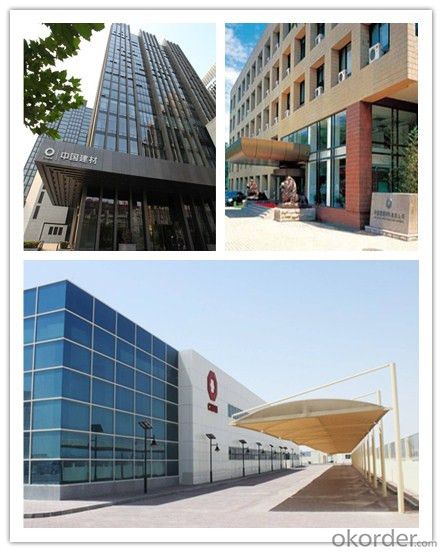
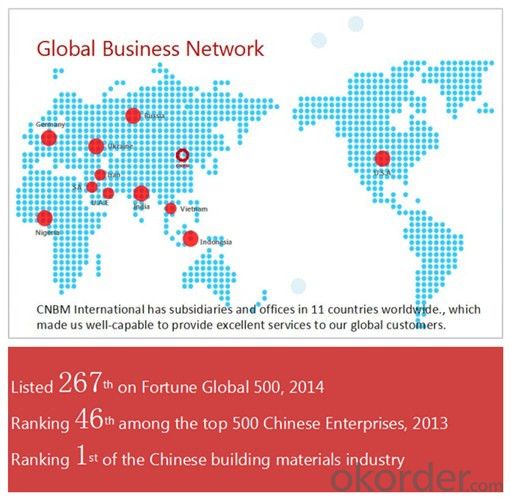
Delivery of the 5.5mm SAE1008 Steel Nail Wire Rod Manufacturer
Packaging Detail | Sea worthy packing /as per customer's packing instruction |
Delivery Detail | 15 ~ 40 days after receiving the deposit |
Products Show
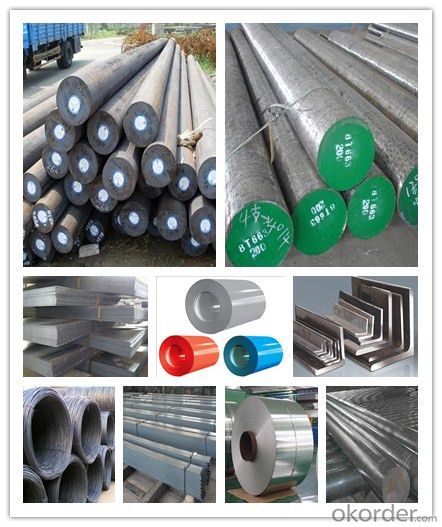
FAQ:
Are you a trading company or manufacturer? | Manufacturer |
What’s the MOQ? | 3 metric ton |
What’s your delivery time? | 15-35 days after downpayment received |
Do you Accept OEM service? | Yes |
what’s your delivery terms? | FOB/CFR/CIF |
What's the Payment Terms? | 30% as deposit,70% before shipment by T/T |
Western Union acceptable for small amount. | |
L/C acceptable for large amount. | |
Scrow ,Paybal,Alipay are also ok | |
Why choose us? | Chose happens because of quality, then price, We can give you both. Additionally, we can also offer professional products inquiry, products knowledge train (for agents), smooth goods delivery, excellent customer solution proposals. |
What's your available port of Shipment? | Main Port, China |
What’s your featured services? | Our service formula: good quality+ good price+ good service=customer's trust
|
Where are your Market? | Covering more than 160 countries in the world |
- Q: How does cryogenic treatment affect the toughness of special steel?
- Cryogenic treatment significantly improves the toughness of special steel. It involves subjecting the steel to extremely low temperatures, typically below -150°C, resulting in the transformation of retained austenite into martensite. This process enhances the steel's microstructure, reducing residual stresses and increasing its hardness, wear resistance, and overall toughness. The cryogenic treatment also refines the grain structure, leading to improved mechanical properties and increased resistance to fatigue and cracking.
- Q: What are the main applications of special steel in the mining exploration?
- Special steel has various crucial applications in mining exploration. One main application is in the construction of drilling equipment, such as drill bits and drill rods, which require high strength and durability to withstand the challenging conditions of drilling in hard rock formations. Another important use of special steel in mining exploration is in the manufacturing of conveyor belts and other material handling systems, which need to be resistant to abrasion and corrosion. Additionally, special steel is employed for the fabrication of mining machinery components like gears, shafts, and valves, ensuring reliable performance and longevity under extreme operating conditions.
- Q: What are the different material selection factors for special steel?
- To ensure the desired performance, durability, and cost-effectiveness of the final product, engineers and designers must consider various factors when selecting materials for special steel. Key factors include mechanical properties, corrosion resistance, heat resistance, machinability, weldability, cost, availability, and environmental impact. 1. Mechanical Properties: Special steel must possess the necessary mechanical properties to meet the demands of the specific application. This includes strength, hardness, toughness, fatigue resistance, and wear resistance. 2. Corrosion Resistance: Depending on the intended use, special steel may need to have high corrosion resistance to withstand harsh environments, chemicals, or moisture. This ensures the longevity and reliability of the steel in its intended application. 3. Heat Resistance: Special steel may need to exhibit excellent heat resistance, especially for applications involving high temperatures like aerospace or power generation industries. The material should retain its strength and structural integrity even at elevated temperatures. 4. Machinability: The ease of machining special steel is crucial, especially for applications involving complex shapes or precision components. High machinability allows for efficient manufacturing processes and reduces production costs. 5. Weldability: Special steel selected for applications requiring welding should have good weldability. This ensures that the material can be easily welded without compromising strength or introducing defects. 6. Cost: The cost of the material plays a significant role in material selection. Engineers and designers must balance desired properties with the available budget to achieve optimal cost-effectiveness. 7. Availability: Ensuring a reliable and consistent supply of the chosen special steel is vital to avoid production delays or interruptions. 8. Environmental Impact: The environmental impact of the material should be evaluated, considering factors such as energy consumption during production, recyclability, and the use of sustainable raw materials. Opting for eco-friendly materials aligns with sustainable practices and regulations. By carefully considering these material selection factors, engineers and designers can choose the most suitable special steel for their specific application, ensuring optimal performance, durability, and cost-efficiency.
- Q: How does special steel resist thermal fatigue?
- Special steel is able to resist thermal fatigue due to its unique composition and properties. Thermal fatigue occurs when a material is subjected to repeated heating and cooling cycles, leading to the formation of cracks and eventual failure of the material. Special steel is specifically designed to withstand extreme temperature changes. It has a high melting point and excellent thermal conductivity, which allows it to efficiently dissipate heat and minimize thermal stress. Additionally, the steel is often alloyed with elements such as chromium, nickel, and molybdenum, which enhance its resistance to thermal fatigue. The alloying elements in special steel form a protective layer that acts as a barrier against oxidation and corrosion. This protective layer prevents the formation of cracks and improves the steel's ability to withstand thermal cycling. Furthermore, the alloying elements improve the steel's structural integrity by promoting the formation of fine and evenly dispersed microstructures. This enhances the steel's toughness and resistance to cracking. Moreover, special steel undergoes various heat treatment processes to further enhance its resistance to thermal fatigue. These processes involve controlled heating and cooling cycles, which refine the microstructure of the steel and make it more resistant to deformation and cracking. The heat treatment also helps in relieving any residual stresses that may have been induced during the manufacturing process. In summary, special steel resists thermal fatigue through its unique composition, alloying elements, and heat treatment processes. Its high melting point, excellent thermal conductivity, and protective layer against oxidation and corrosion make it highly resistant to thermal cycling. The refined microstructure and relieved residual stresses further enhance its ability to withstand repeated heating and cooling cycles without failure.
- Q: Can special steel be used in the agricultural industry?
- Yes, special steel can be used in the agricultural industry. Special steels, such as high-strength and corrosion-resistant varieties, can be utilized for various applications in agriculture. These steels can be used to manufacture farm equipment, machinery, tools, and infrastructure such as storage containers, irrigation systems, and agricultural buildings. The properties of special steel, such as durability, resistance to wear and tear, and ability to withstand harsh environmental conditions, make it suitable for enhancing productivity and longevity in agricultural operations.
- Q: What are the different methods for tempering special steel?
- There are several different methods for tempering special steel, including air tempering, oil tempering, water tempering, and salt bath tempering. Air tempering involves heating the steel to a specific temperature and then allowing it to cool in air. Oil tempering involves heating the steel to a specific temperature and then quenching it in oil. Water tempering is a similar process, but the steel is quenched in water instead. Salt bath tempering involves heating the steel in a molten salt bath to achieve the desired tempering temperature. Each method has its own advantages and is chosen based on the specific properties and requirements of the steel being tempered.
- Q: What are the different methods of improving the machinability of special steel?
- There are several methods that can be employed to improve the machinability of special steel. These methods include: 1. Alloying: By introducing certain alloying elements, such as sulfur, selenium, lead, or bismuth, into the steel composition, the machinability can be enhanced. These elements act as lubricants during machining, reducing friction and cutting forces. 2. Heat treatment: Heat treatment processes like annealing, normalizing, or stress relieving can help improve the machinability of special steel. These processes refine the microstructure, reduce hardness, and increase ductility, making the material easier to machine. 3. Microstructural modifications: Modifying the microstructure of special steel through processes like grain refinement or controlled precipitation of carbides can enhance machinability. Fine-grained steels are generally easier to machine due to reduced cutting forces. 4. Surface coatings: Applying specialized coatings, such as titanium nitride (TiN) or diamond-like carbon (DLC), on the surface of special steel can reduce friction, improve tool life, and enhance chip flow during machining. 5. Tool selection and optimization: Choosing appropriate cutting tools with specific geometries, coatings, and cutting parameters can significantly improve machinability. Optimal tool selection ensures efficient chip evacuation, reduces heat generation, and minimizes tool wear. 6. Machining parameters optimization: Adjusting machining parameters like cutting speed, feed rate, and depth of cut can have a significant impact on machinability. Fine-tuning these parameters can help reduce tool wear, control chip formation, and achieve better surface finish. 7. Lubrication and cooling: Proper lubrication and cooling methods, such as using cutting fluids or coolants, can enhance machinability by reducing friction and heat generation during machining. This helps prolong tool life and minimize workpiece deformation. It is important to note that the specific method or combination of methods used to improve machinability will depend on the type of special steel and the desired machining outcome.
- Q: How does mold steel resist wear and erosion?
- Mold steel resists wear and erosion due to its high hardness, toughness, and resistance to deformation. It has a fine microstructure that allows it to withstand the repetitive stresses and strains associated with molding processes. Additionally, certain alloying elements like chromium and molybdenum enhance its corrosion resistance, making it more durable against wear and erosion caused by environmental factors.
- Q: What is the purpose of cold drawing in special steel production?
- Cold drawing is utilized in special steel production with the aim of enhancing the mechanical properties and dimensional accuracy of the steel. This technique involves pulling the steel through a die at room temperature, which leads to a reduction in the cross-sectional area and an increase in the length of the steel. By undergoing this process, the microstructure of the steel is refined, resulting in improved strength, hardness, and toughness. Furthermore, cold drawing has the ability to improve the surface finish and straightness of the steel, ensuring precise dimensions and making it suitable for a wide range of applications that require high-quality steel. In summary, cold drawing plays a vital role in improving the performance and quality of special steel, making it more dependable and efficient in various industrial sectors.
- Q: How does special steel contribute to the medical field?
- Unique properties and characteristics of special steel are essential in the medical field, playing a crucial role. Surgical instruments and medical devices heavily rely on special steel due to its exceptional strength, durability, and corrosion resistance. These qualities ensure that the instruments can endure the demanding surgical environment, maintain sharpness for extended periods, and withstand sterilization processes. Moreover, special steel finds application in the manufacturing of implants and prosthetics. Its biocompatibility and high strength-to-weight ratio make it an ideal material for creating artificial joints, spinal implants, and dental implants. The ability of special steel to integrate with the human body without causing adverse reactions or rejection is vital for the success of these medical interventions. Additionally, special steel is utilized in the production of medical equipment such as MRI machines, X-ray machines, and radiation shields. Certain types of special steel possess unique magnetic properties, enabling the creation of powerful magnets used in MRI machines. This allows for detailed and accurate imaging of the human body. Furthermore, special steel's ability to shield against radiation makes it a critical component in radiation therapy equipment, safeguarding healthcare professionals and patients from harmful radiation exposure. In conclusion, special steel's strength, durability, corrosion resistance, biocompatibility, and unique magnetic properties make it an indispensable material in the medical field. It finds applications in surgical instruments, medical devices, implants, prosthetics, and medical equipment. The contributions of special steel in ensuring the safety, effectiveness, and success of various medical procedures and treatments are invaluable.
Send your message to us
5.5mm SAE1008 Steel Nail Wire Rod Manufacturer
- Loading Port:
- Tianjin
- Payment Terms:
- TT OR LC
- Min Order Qty:
- 10 m.t.
- Supply Capability:
- 10000 m.t./month
OKorder Service Pledge
OKorder Financial Service
Similar products
Hot products
Hot Searches
Related keywords
